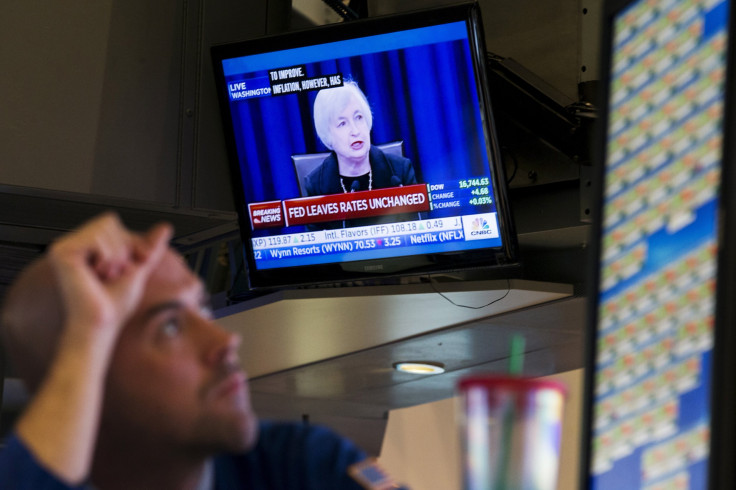Federal Reserve Rate Hike: Odds Of A 2015 Liftoff Diminish

Prospects that the U.S. Federal Reserve will raise historically low interest rates in 2015 continue to crumble, following a week of downbeat messages from Fed officials and unconvincing economic data critical to the coming rate decision.
Market sentiment now indicates a mere 5 percent probability that the Fed will lift near-zero interest rates at its Oct. 28 meeting. Those odds rise to 30 percent for the meeting scheduled in December, despite Fed Chair Janet Yellen’s repeated assurances that she expects to lift rates by the end of the year.
Although banks are eager for higher interest earnings and markets have clamored for certainty around the timing of the inevitable decision, consumers might breathe a little easier. If the Fed opts against liftoff in 2015, borrowers will have another few months to refinance mortgages and pick up low-interest credit cards before rates rise. The tradeoff, of course: Savings accounts will continue to accrue infinitesimal interest income.
For global markets, the news carries even greater significance. European Central Bank Vice President Vitor Constancio said Thursday that a 2015 American rate rise could destabilize the world economy by attracting more capital into the U.S. during a particularly tenuous period for emerging markets. “The global economy has become more vulnerable than ever before to very large real and financial spillovers,” Constancio said.
Inharmonious Communications
Those fears are easing this week as Fed officials voice doubts that economic indicators support a rate hike. In a speech Monday, Fed Gov. Lael Brainard swore against making “calendar-based statements” -- of the sort that Yellen and others have made -- suggesting that lower-than-expected inflation data supports “continuing to carefully nurture the U.S. recovery” with low interest rates.
The next day, fellow Gov. Daniel Tarullo said he did not “expect that it would be appropriate” to lift rates in 2015, given the shaky economic situation.
The comments, which seemed to contradict the expectations of Yellen and Federal Reserve Vice Chairman Stanley Fischer, created the appearance of a rift. JPMorgan Chase economist Michael Feroli wrote that the Fed’s “communications may continue to sound inharmonious” up until December.
But William Dudley, president of the Federal Reserve Bank of New York, downplayed the officials’ differences in a panel discussion Thursday. "We are all pretty much on the same page,” Dudley said, after raising concerns around the effects of the strong dollar and sliding global growth on U.S. economic expansion.
Economic data released Thursday proved unconvincing. Although monthly jobless claims of 255,000 surprised analysts with a drop to the lowest point since 1973, inflation remained muted. Overall, prices fell 0.2 percent for the month of September, while so-called core inflation, which excludes energy and food, picked up 1.9 percent for the year.
Before it lifts interest rates, the Fed is looking for an indication that inflation will hit a solid 2 percent, a level that has proved elusive as cheap energy puts a damper on price gains. Although unemployment has fallen to 5.1 percent from a 2010 high of 10 percent, the expected pickup in inflation still has not materialized.
Wage gains, meanwhile, remain “mostly subdued,” according to the Fed’s semi-regular Beige Book of economic commentary.
Global concerns are likely to remain paramount as the Fed prepares to reconvene. The late summer’s global market tumult, stemming largely from soft economic news and plummeting asset prices in China, weighed on the Fed’s decision to keep rates at virtually zero in its September meeting.
For the first time in years, the Fed’s official statement explicitly cited “global economic and financial developments” in its reasoning.
Incidentally, equity markets the world over have experienced a rebound in October, heartened by the vanishing prospects of a 2015 U.S. rate hike, which would draw capital out of emerging markets and drive some investors to cash out of stock positions.
© Copyright IBTimes 2024. All rights reserved.












